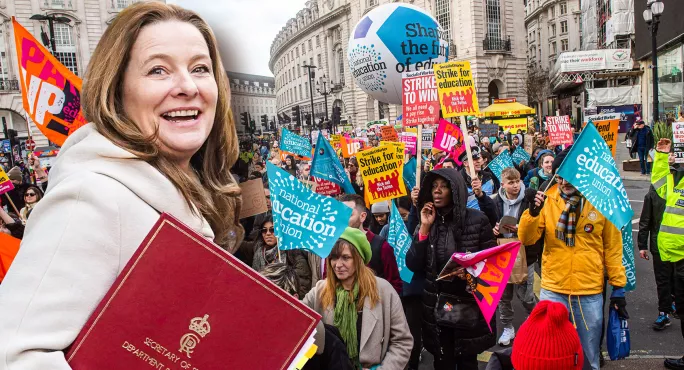Teacher pay talks: Still ‘no new offer’ from DfE

Union leaders have said that today’s teacher pay talks with education secretary Gillian Keegan have again ended with ”no new offer to improve the inadequate pay settlement”, despite movement in the disputes in Scotland and Wales.
And one union leader has warned of further balloting over strike action “unless tangible progress is made”.
Geoff Barton, general secretary of the Association of School and College Leaders (ASCL), and Paul Whiteman, general secretary of the NAHT school leaders’ union, warned that the Westminster government was now the “outlier”.
Union bosses and Department for Education officials met today to discuss teacher pay for the first time since the NEU teaching union national strike day on 1 February.
But no new offer was tabled according to union leaders meaning the NEU looks set to proceed with its announced strike dates and could launch more from next month.
- Teacher pay talks: “Dithering” will “deepen teachers’ anger”, Keegan warned
- Background: DfE talks must “move mountains” to stop walkouts
- Pay: Has teacher pay in the UK risen with inflation, and how does it compare?
Commenting on the talks today, Mr Barton said that while they “signalled a greater sense of urgency on the part of the government, we have to report that once again there is no new offer to improve the inadequate pay settlement which has sparked the ongoing dispute”.
And while conversations had taken place about ”addressing systemic issues which drive unsustainable workload pressures on education staff”, Mr Barton said that there had been no “concrete” progress made in this area either.
“Unless pay and conditions are improved, the severe teacher shortages being experienced by many schools will worsen and so will the impact on the education of young people,” he said.
More unions could launch strikes over pay
Mr Barton added that “we cannot go on like this”.
“Unless there is tangible progress towards an improved offer, the prospect of further strike action by NEU members is inevitable, and will lead to members of our union, and other education unions, also concluding that industrial action is the only option left,” he said.
In a consultative ballot held by the ASCL in the autumn, almost seven in 10 members of the major headteachers’ union voted to move to a formal ballot on strike action.
And Mr Barton warned that while the union has ”held off from that step [a formal ballot] and tried to resolve the dispute through negotiation...there is a limit to how many times we can come out of a meeting with the education secretary without progress being made”.
“Both Wales and Scotland are making offers in an effort to improve pay and avert further strikes. Those offers might not be perfect, and won’t satisfy everyone, but they are a great deal better than anything managed by the government in Westminster, which has put nothing on the table so far despite having far more resources at its disposal,” he added.
“We expect further talks to take place shortly, and we hope that there will be a breakthrough.”
Negotiations in England have so far failed to reach a resolution to the pay dispute. The government has not increased the pay offer it announced last July of 5 per cent for experienced teachers
Speaking ahead of the meeting yesterday, Dr Patrick Roach, general secretary of the NASUWT teaching union, said the union welcomed the opportunity to meet with the secretary of state again but added that he now needed to hear ”specific proposals” to “address our members’ concerns”.
He said it was ”unacceptable” that ministers had so far “failed to come forward with any proposals for our members to consider”.
And speaking to Tes after the talks, Mr Whiteman said that while “there was a more positive atmosphere in the room” there wouldn’t be much movement until the government brings a new pay offer.
“I think what the secretary of state needs to understand and what the Westminster government needs to understand is that in every other jurisdiction, the value of teachers and school leaders has been understood and meaningful pay offers are being made, and now the outlier is England and England needs to catch up,” he said.
The Department for Education has said that more talks will take place before the next strike date.
Commenting on the latest talks a DfE spokesperson said: ”Education secretary, Gillian Keegan held further constructive talks with union leaders today.
“They discussed a range of issues such as workload reduction, and recruitment and retention.
“The education secretary instructed officials to hold further detailed talks with unions and committed to more talks ahead of planned strike action.”
Parents ‘support teachers’
A poll by the charity Parentkind that was conducted before the first strike date this month suggests that parent support for teachers was strong.
In the poll of more than 1,200 parents at the end of January, 63 per cent said teachers should receive a pay settlement in line with current inflation figures and 54 per cent supported the strike action, while over a third opposed it.
You need a Tes subscription to read this article
Subscribe now to read this article and get other subscriber-only content:
- Unlimited access to all Tes magazine content
- Exclusive subscriber-only stories
- Award-winning email newsletters
Already a subscriber? Log in
You need a subscription to read this article
Subscribe now to read this article and get other subscriber-only content, including:
- Unlimited access to all Tes magazine content
- Exclusive subscriber-only stories
- Award-winning email newsletters
topics in this article



